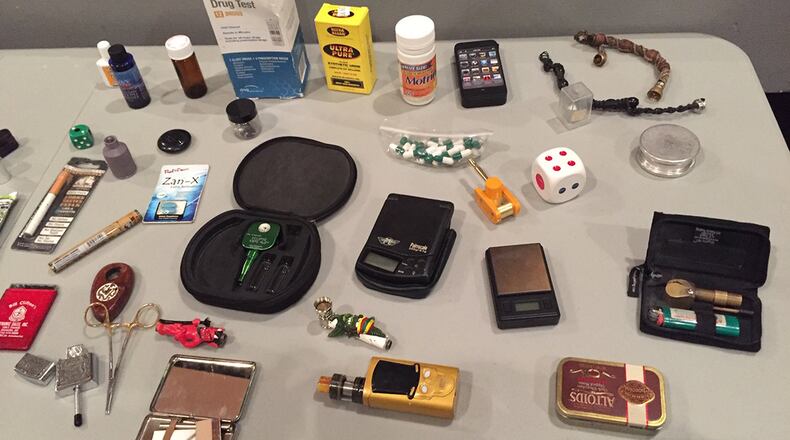“We provide information on what’s happening throughout the nation when it comes to drug abuse,” said Michael Powell, a retired sergeant and Air Force Security Forces veteran in Vietnam. “We give a very wide view of indicators – what to look for in terms of paraphernalia, items associated with use of the drugs and the main drugs we see currently that are creating issues. It’s a lot to handle within a four-hour period.”
He said the program provides information on drug abuse at work but also for the home front, “because the sad thing is … kids know so much more than their parents.”
Shawn Bain, a retired captain and Powell’s presenting partner, said bringing Operation Street Smart to the base was special.
“We have such a strong admiration for the military,” he said. “Serving as a public servant in law enforcement for over 30 years, it gives us a special bond with the military and first responders. We want the military members to realize the important of education on this. Knowledge is power.”
“Our goal is to empower the audience members to take what is learned into their communities,” said Senior Airman Luke Albritton, an intern for the ADAPT certified alcohol use counselor and one of the event organizers. “Parents need to be aware of the temptations that are out there for their loved ones.”
The goal of Street Smart is to provide current and up-to-date narcotics information on trends, terminology, paraphernalia and physiological effects to those individuals who deal with today’s youth on a daily basis.
The event focused on education and prevention, which is the ADAPT Program’s mission. Two of its personnel, Albritton and Capt. Eunice Kim, current ADAPT program manager, attended a Street Smart event in Dayton earlier this year and decided to bring it to the Wright-Patterson AFB community.
“I think it’s important to bring that knowledge here,” Albritton said.
The event was interesting because it was like “show and tell,” Kim said, with the retired investigators showing what they discovered and experienced through their long careers. The items they demonstrated can be surprising and “hidden in plain sight,” such as a hairbrush’s handle or a water bottle with a compartment that can be used to conceal illicit drugs.
“They want to help prevent the younger population from ever developing an addiction,” she said. “It starts at a young age.”
Information shared showed what today’s drugs look like, the street names kids may call them, current trends and more. Powell and Bain also shared their contact information so they may be helpful to attendees facing issues such as trying to identify something from a photo or a text message.
“I think that’s a tremendous takeaway,” Kim said, “to have a way to contact someone like a former investigator who has done this his entire career and can be contacted to help you. That’s pretty incredible.”
Today’s technology plays a role in drug and alcohol abuse, Albritton pointed out.
“We have everything at the access of our fingertips, with Google and social media to where these trends spread like wildfire,” he said. “It’s very important we stay on top of them for prevention purposes.”
But there is another compelling reason to be fully informed about this topic, Kim said.
“This really impacts readiness,” she said. “A lot of times we look at the military member and see if they are ready to deploy. Many times we also have to look at the family. Are they all healthy individuals? Do they need more care? Unfortunately, addiction and drug use come into the picture and causes issues that destroy families. That is another piece to this.”
Albritton noted that prevention is key, too, so such issues don’t arise and affect members.
Albritton may be contacted at luke.s.albritton.mil@mail.mil. For ADAPT Program questions, contact the Mental Health Clinic, 88th Medical Group, at 937-257-6877.
About the Author
